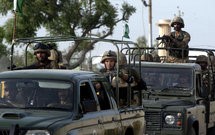 Just days after watching a much-awaited counteroffensive against jihadis in North Waziristan, Islamabad finds itself distracted by the homecoming of populist religious scholar-turned-politician Tahir-ul-Qadri, who returned Monday from Canada to lead a "revolution" against what he considers a corrupt political order. His arrival has grave implications for one of the world's largest Muslim countries.
Just days after watching a much-awaited counteroffensive against jihadis in North Waziristan, Islamabad finds itself distracted by the homecoming of populist religious scholar-turned-politician Tahir-ul-Qadri, who returned Monday from Canada to lead a "revolution" against what he considers a corrupt political order. His arrival has grave implications for one of the world's largest Muslim countries.
Pakistan falls into the perilous category of countries where military rule is no longer viable but where the public has grown disenchanted with democracy. As in Iraq and Egypt, the military can no longer impose order, but public frustration with democracy has seen attempts at armed uprising to bring change extralegally.
In countries that have only recently seen the decline of military regimes or single-party rule, the public typically sees democracy as a means to attain its expectations from the ruling class. Having such a large portion of the population lose faith in the democratic process, as has happened in Pakistan, is unusual.
Pakistan's first democratic transition happened in 2013, when now-Prime Minister Nawaz Sharif's Pakistan Muslim League won the general elections and succeeded the elected government of Asif Ali Zardari's Pakistan People's Party. The Pakistan Muslim League's victory in large part resulted from popular anger at perceptions of corruption and incompetence within the former ruling party. Just one year later, Sharif finds himself on the defensive against Qadri's Pakistan Awami Tehrik.
The movement Qadri leads has broad appeal among the middle class. But as is the reality in such situations, Qadri also enjoys the support of powerful quarters, including a well-oiled political machine. A large cross-section of the business community is underwriting his movement to protect and enhance their financial interests. Meanwhile, his fatwa against jihadis has garnered support from many abroad and especially in the military establishment, which hopes to use his movement to curb the decline of military influence.
But Qadri is promising a future his movement cannot deliver. Meanwhile, his promotion of revolution is weakening the constitutional order. Ideally, he would like to create a situation in which the government -- and for that matter, the entire system -- simply resigns. But in the likely event that his movement cannot adequately fill the resulting vacuum, the military would be in no position to step in and stabilize the situation, given its current weakness.
This means that if Qadri manages to remove the current order, anarchy would likely ensue. Only the Taliban are in a position to benefit from such a scenario. They are far more powerful than Qadri and would be delighted to exploit the opening he is trying to create.
This is not just the story of Pakistan. It also describes the state of affairs in the Middle East, where old military-dominated orders are collapsing, democracies are struggling to be born and the masses are using their newfound freedom to mount disruptive protests that hamper the emergence of a new democratic order. This opens the door for jihadi non-state actors to step up and take advantage of the situation.
Courtesy : Stratfor (www.stratfor.com)